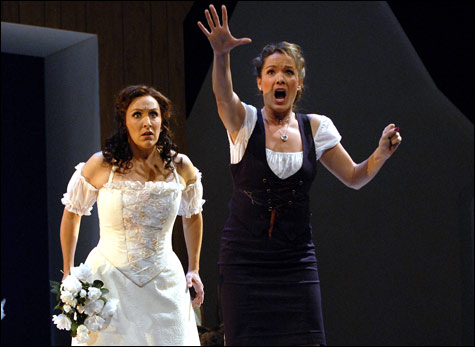
MODERN MESS: Updating Der Freischütz didn’t work for Opera Boston. |
Last week’s Boston Symphony Orchestra program looked odd on paper. It opened with Tchaikovsky’s Pathétique Symphony, a piece that, despite its quiet ending, invariably ends a concert. After intermission came the world premiere of Leon Kirchner’s The Forbidden, and then Schumann’s Piano Concerto, a piece invariably played before intermission. Maybe James Levine chose this order because the Schumann is a more romantic, optimistic, exhilarating work to end with. Or maybe he regarded the great Italian pianist Maurizio Pollini’s return to the BSO for the first time in 18 years as the main event. Whatever the motivation for this program order, the concert was a knockout.
The Pathétique is also usually played with its heart on its sleeve and its guts hanging out. But Levine allowed it to unfold effortlessly, the climaxes unforced, and he gave the places where woodwinds dominate a restrained chamber-music intimacy (a particular bravo to bassoonist Richard Svoboda as the eloquent, melancholy “voice” of the hero). The first movement’s impassioned second subject, one of Tchaikovsky’s most famous tunes, sounded fresh and honestly felt rather than pumped-up and over-the-top. The tilted waltz (not in 3/4 but in 5/4 time) was seductively understated, and in the trio section the timpani’s steady underlying heartbeat was a palpable presence. Then the orchestra took off on a march Tchaikovsky makes so triumphant (Allegro molto vivace), it inevitably elicits a round of applause. The real ending, Adagio lamentoso, is one of the most desolate symphonic movements ever written. And again, Levine led it less for wild grief than for formal solemnity, less for full closure than for anticipation of something to follow.
Kirchner’s new piece, a BSO commission, is actually his orchestral version of a 2003 piano sonata he’s already turned into a 2006 string quartet. Yet these three “identical” pieces sound amazingly different from one another, each completely faithful to its own idiom. The sonata, with its explicit reference to a late Beethoven sonata, sounds a little like a cross between Beethoven and Schoenberg, one of Kirchner’s teachers at UCLA in the 1930s. (Kirchner turns 90 in January.) The title The Forbidden refers to the Schoenberg-like composer’s pact with the Devil in Thomas Mann’s Doctor Faustus. (Kirchner dares to use “forbidden” tonalities.) If the new orchestral piece suggests anyone else (and Kirchner never really sounds like anyone else), it’s a 21st-century Mahler. The Forbidden, brilliantly orchestrated (there’s an electrifying xylophone), seems to compress a whole Mahler symphony into 12 intense minutes exploding from a single nucleus — rhapsodic, restless, surprising, forward-tumbling, rapidly unfolding, fleetingly fugal, rhythmically intricate, and in its quieter passages, touchingly, mysteriously beautiful. Kirchner, who now lives in New York but for decades was one of Harvard’s most distinguished and beloved teachers, received the evening’s second standing ovation.
Then Pollini. This was his very first collaboration with Levine and it was marvelously symbiotic. Both play not just bars of music but phrases, and they lean into those phrases to create a sense of forward momentum. Pollini is famous for his restraint and his impeccable technique; in recital, he can take half a concert to warm up. Here he was fired up from the get-go, scintillating (the word means “igniting sparks”), tender and playful in the piano’s intimate conversation with the orchestra (in the slow movement a particularly lovely dialogue with clarinettist William R. Hudgins), magical in the piano’s fanciful embroidery, dazzling in trills and arpeggios — an astonishing combination of delicacy and bravura, clarity and impetuosity. Standing O number three!